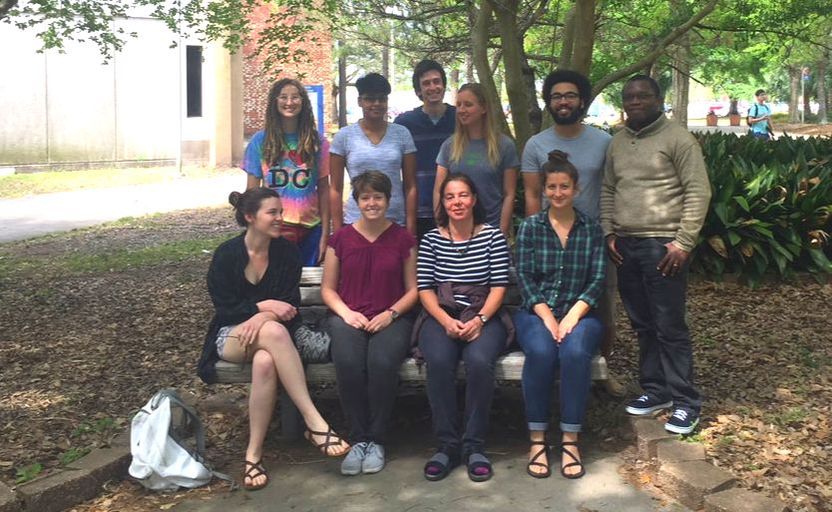Principal Investigator
Pr. Nicola Anthony
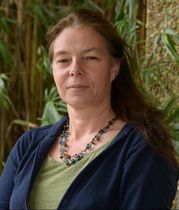
I am a broadly trained biologist with strong interests in evolutionary biology, molecular ecology and conservation genetics. After finishing my Ph.D. and spending 6 months in the tropical forests of Peru, I moved to the University of Wisconsin to study the molecular genetics of pesticide resistance. At the same time, I also went back to graduate school to study for a Master’s in conservation biology and sustainable development. I then left the US to participate in a conservation research and capacity building project in Gabon that was focused around the molecular ecology and conservation of western lowland gorillas.
Since joining the University of New Orleans in 2003, I have continued to expand my interests in evolutionary biology and its application to conservation. I have also developed a strong international collaborative component to my research and in 2011 co-organized a workshop in evolution and conservation at the national science university of Gabon (Universite des Sciences et Techniques de Masuku). More recently, I have begun a major collaborative project that is centered around conservation of biodiversity under climate change in Central Africa: the Central African Biodiversity Alliance funded through the NSF Partnerships for International Research and Education program. More recently, I was fortunate enough to receive the Freeport McMoRan Endowed Chair which has allowed me to invest in a number of student projects in Louisiana and overseas. If you are interested in joining my lab or simply would like to know more about any of our projects please email me here: [email protected]
Since joining the University of New Orleans in 2003, I have continued to expand my interests in evolutionary biology and its application to conservation. I have also developed a strong international collaborative component to my research and in 2011 co-organized a workshop in evolution and conservation at the national science university of Gabon (Universite des Sciences et Techniques de Masuku). More recently, I have begun a major collaborative project that is centered around conservation of biodiversity under climate change in Central Africa: the Central African Biodiversity Alliance funded through the NSF Partnerships for International Research and Education program. More recently, I was fortunate enough to receive the Freeport McMoRan Endowed Chair which has allowed me to invest in a number of student projects in Louisiana and overseas. If you are interested in joining my lab or simply would like to know more about any of our projects please email me here: [email protected]
Graduate Students and Postdoctoral Researchers
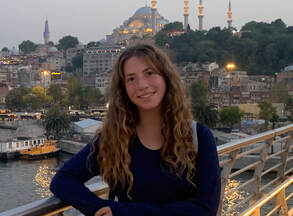
Lydia DiPaola
I am a first year Master’s Student working in the Anthony Lab. After getting my Biological Sciences B.S. from Arizona State University, I spent 1.5 years living abroad in the Czech Republic teaching English remotely and traveling abroad when I could. During this time, I was inspired to go back to school and am now at the University of New Orleans. My research interests include ecology and evolution. I would eventually like to pursue a PhD in the same or similar focus.
Currently, I am collaborating with Jean LaFitte National Park to monitor a shoreline restoration project for my thesis research. The park is constructing a shoreline protection barrier to promote natural recruitment for 50 acres of submerged aquatic vegetation, an important feature in wetlands that provides fish nursery habitat and reduces coastal erosion. I am monitoring local fish community responses, water quality changes, and shoreline position in response to the barrier. Monitoring initial responses will help enhance active management of the barrier and provide insight on ecological effects of this restoration project.
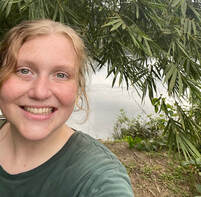
Emily Bowers
Hello! My interest in biology began at Louisiana State University in Baton Rouge when I worked as a research and curatorial assistant at the LSU Museum of Natural Science. While I was there, I learned about the importance of biodiversity and the adaptations that make species distinct from one another. I worked to install mammal specimens in the museum and assisted with a PhD project exploring the speciation of Bunomys mice in Sulawesi, Indonesia. During my time in undergraduate school, I also worked as a veterinary technician. By the time I graduated in 2021, I knew I had two loves: wildlife conservation and veterinary medicine. I then accepted a hoofstock keeper internship at Audubon Nature Institute’s Species Survival Center, where I found the niche I was looking for. I decided to pursue my master’s degree at UNO in the Anthony Lab and plan to go to veterinary school once I graduate.
While at UNO, I have been fortunate enough to travel to Gabon, Central Africa, with Dr. Anthony where I participated in the ECO-TROP conservation field school Dr. Anthony co-teaches every year. I learned about the hands-on application of conservation techniques such as abundance and biodiversity surveys. We also worked with local villagers to asses sustainable harvest numbers for duikers in the tropical forest. My next adventure was in Fortin Toledo, Paraguay, where I completed my fieldwork for my master’s thesis. I partnered with the Audubon Nature Institute and traveled to the dry Chaco Forest in Paraguay with Michelle Hatwood. Our research was based out of El Centro Chaqueno para la Investigacion y Conservacion (CCCI) where I collaborated in a radio-collaring study of Lowland tapirs (Tapirus terrestris) and collected fecal samples for a population genetic analysis of this small population of tapirs. This area in Paraguay is highly fragmented because of the growing agricultural industry in the region. There are no current genetic studies on tapirs in the dry Chaco forest, so this research is very exciting! I am assessing fecal samples using microsatellite markers to determine census population size and a pedigree of the tapir in the area. We will use mitochondrial DNA to integrate the tapirs into a phylogeny of lowland tapirs in other parts of South America. Finally, we will analyze the radio telemetry data to determine the range of the tapirs over a period of a year or so. After I finish my master's, I plan to attend vet school and integrate my wildlife research with conservation medicine.
Hello! My interest in biology began at Louisiana State University in Baton Rouge when I worked as a research and curatorial assistant at the LSU Museum of Natural Science. While I was there, I learned about the importance of biodiversity and the adaptations that make species distinct from one another. I worked to install mammal specimens in the museum and assisted with a PhD project exploring the speciation of Bunomys mice in Sulawesi, Indonesia. During my time in undergraduate school, I also worked as a veterinary technician. By the time I graduated in 2021, I knew I had two loves: wildlife conservation and veterinary medicine. I then accepted a hoofstock keeper internship at Audubon Nature Institute’s Species Survival Center, where I found the niche I was looking for. I decided to pursue my master’s degree at UNO in the Anthony Lab and plan to go to veterinary school once I graduate.
While at UNO, I have been fortunate enough to travel to Gabon, Central Africa, with Dr. Anthony where I participated in the ECO-TROP conservation field school Dr. Anthony co-teaches every year. I learned about the hands-on application of conservation techniques such as abundance and biodiversity surveys. We also worked with local villagers to asses sustainable harvest numbers for duikers in the tropical forest. My next adventure was in Fortin Toledo, Paraguay, where I completed my fieldwork for my master’s thesis. I partnered with the Audubon Nature Institute and traveled to the dry Chaco Forest in Paraguay with Michelle Hatwood. Our research was based out of El Centro Chaqueno para la Investigacion y Conservacion (CCCI) where I collaborated in a radio-collaring study of Lowland tapirs (Tapirus terrestris) and collected fecal samples for a population genetic analysis of this small population of tapirs. This area in Paraguay is highly fragmented because of the growing agricultural industry in the region. There are no current genetic studies on tapirs in the dry Chaco forest, so this research is very exciting! I am assessing fecal samples using microsatellite markers to determine census population size and a pedigree of the tapir in the area. We will use mitochondrial DNA to integrate the tapirs into a phylogeny of lowland tapirs in other parts of South America. Finally, we will analyze the radio telemetry data to determine the range of the tapirs over a period of a year or so. After I finish my master's, I plan to attend vet school and integrate my wildlife research with conservation medicine.
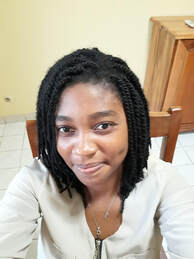
Awdrea Lysiane Ibinga Manga
Hi, I am a first year master’s student at the Anthony Lab. I got my bachelor’s degree in General Biology and Earth Sciences at Université des Sciences et Techniques de Masuku in Gabon. After that, I decided to take a gap year, during which I did an immersion internship at the Scientific Unit of the National Agency of National Parks as a research assistant in charge of the scientific monitoring of the National Parks outside the wetlands in Gabon. During my undergraduate studies I participated in several field trips, where I took part in workshops and developed research projects on the study of the diversity of mammals in the Ndambi forest under the supervision of Dr. Ntie and Pr. Anthony. I was a student supervisor at ECOTROP-Littoral and Mangroves 2022 at the Raponda Walker Arboretum and Akanda National Park, and I participated in ECOTROP-Forest 2022 in Lastourville in the village Doumé. Additionally, I participated in a field mission on bioacoustic monitoring, deploying bioacoustics devices in Moukalaba-Doudou National Park. During my internship, I took part in the National Training Workshop on Key Biodiversity Areas (KBAs).
In 2024 I moved to New Orleans, where I started work at the Anthony Lab. I’m currently working on a project aimed at determining the diet of forest artiodactyls (duikers in the Central Africa forests) in Lopé National Park (LNP) through metabarcoding. From this study, we aim to obtain a census of LNP forest plants and to verify the availability of DNA barcodes from the trnL gene. Additionally, we are extracting DNA from the samples of duiker feces and plants at LNP, sequencing and analyzing our results. This project is being carried out in collaboration with the Université des Sciences et Techniques de Masuku, the National Agency of National Parks of Gabon, and the National Herbarium of Gabon. I plan to continue my studies with a PhD in wildlife conservation biology.
Hi, I am a first year master’s student at the Anthony Lab. I got my bachelor’s degree in General Biology and Earth Sciences at Université des Sciences et Techniques de Masuku in Gabon. After that, I decided to take a gap year, during which I did an immersion internship at the Scientific Unit of the National Agency of National Parks as a research assistant in charge of the scientific monitoring of the National Parks outside the wetlands in Gabon. During my undergraduate studies I participated in several field trips, where I took part in workshops and developed research projects on the study of the diversity of mammals in the Ndambi forest under the supervision of Dr. Ntie and Pr. Anthony. I was a student supervisor at ECOTROP-Littoral and Mangroves 2022 at the Raponda Walker Arboretum and Akanda National Park, and I participated in ECOTROP-Forest 2022 in Lastourville in the village Doumé. Additionally, I participated in a field mission on bioacoustic monitoring, deploying bioacoustics devices in Moukalaba-Doudou National Park. During my internship, I took part in the National Training Workshop on Key Biodiversity Areas (KBAs).
In 2024 I moved to New Orleans, where I started work at the Anthony Lab. I’m currently working on a project aimed at determining the diet of forest artiodactyls (duikers in the Central Africa forests) in Lopé National Park (LNP) through metabarcoding. From this study, we aim to obtain a census of LNP forest plants and to verify the availability of DNA barcodes from the trnL gene. Additionally, we are extracting DNA from the samples of duiker feces and plants at LNP, sequencing and analyzing our results. This project is being carried out in collaboration with the Université des Sciences et Techniques de Masuku, the National Agency of National Parks of Gabon, and the National Herbarium of Gabon. I plan to continue my studies with a PhD in wildlife conservation biology.
Undergraduate Students

Lance Hosli
I'm Lance Hosli, set to graduate from the University of New Orleans in the spring of 2024 with a biology degree and a minor in chemistry. Come fall, I aim to dive into the master's program. I have worked in various undergraduate lab positions; however, my current focus is assisting Emily Bowers with her Lowland Tapir project.
I love nature, plant life, and learning about conservation efforts. Despite not having a keen interest in genetics, I find the lab environment both informative and welcoming. I'll use this experience as a stepping stone for my future in science.
I'm Lance Hosli, set to graduate from the University of New Orleans in the spring of 2024 with a biology degree and a minor in chemistry. Come fall, I aim to dive into the master's program. I have worked in various undergraduate lab positions; however, my current focus is assisting Emily Bowers with her Lowland Tapir project.
I love nature, plant life, and learning about conservation efforts. Despite not having a keen interest in genetics, I find the lab environment both informative and welcoming. I'll use this experience as a stepping stone for my future in science.

Morgan Ives
Although I worked as an English teacher for the better part of a decade, my long-standing love for nature and animals eventually led me to go back to school to pursue a degree in Biological Sciences at Universidad del Valle in Guatemala, where I was born and raised. In 2021 I moved to New Orleans, where I obtained my bachelor’s degree from UNO in the Fall of 2023. At the Anthony Lab, I am currently working on Emily’s project on the lowland tapir. My main interest, however, lies in the conservation of bats and the impacts that white-nose syndrome has had on countless bat populations across North America.
Although I worked as an English teacher for the better part of a decade, my long-standing love for nature and animals eventually led me to go back to school to pursue a degree in Biological Sciences at Universidad del Valle in Guatemala, where I was born and raised. In 2021 I moved to New Orleans, where I obtained my bachelor’s degree from UNO in the Fall of 2023. At the Anthony Lab, I am currently working on Emily’s project on the lowland tapir. My main interest, however, lies in the conservation of bats and the impacts that white-nose syndrome has had on countless bat populations across North America.
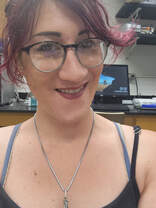
Sable Fae Murphy
I am a New Orleans native and have a deep love and appreciation for the flora and fauna of Louisiana. I have a background in coastal/estuarine ecology and want to help preserve the biodiversity and ecological functions of Louisiana's coastline. My interests are in modeling ecosystem processes and informing management actions through predictive/statistical modeling. I'm starting my Master's in the Fall of 2024 in UNO's Earth and Environmental science department, who often collaborate with the Anthony Lab!
I am a New Orleans native and have a deep love and appreciation for the flora and fauna of Louisiana. I have a background in coastal/estuarine ecology and want to help preserve the biodiversity and ecological functions of Louisiana's coastline. My interests are in modeling ecosystem processes and informing management actions through predictive/statistical modeling. I'm starting my Master's in the Fall of 2024 in UNO's Earth and Environmental science department, who often collaborate with the Anthony Lab!
